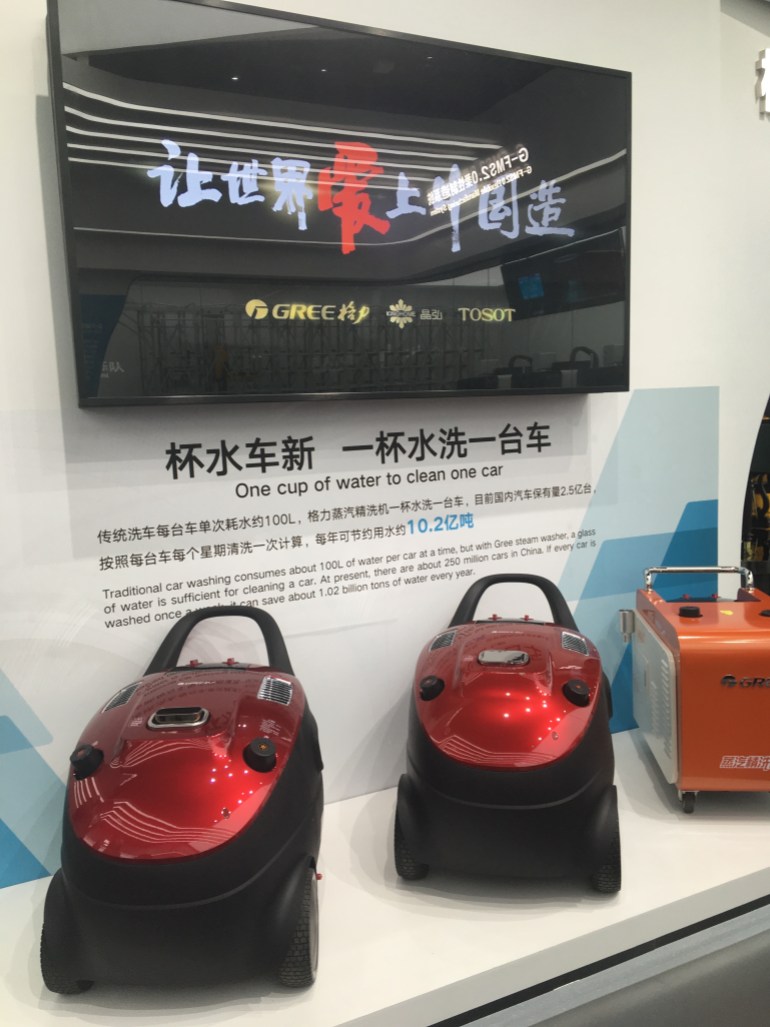As US election nears, some Chinese firms turn away from the world
Chinese corporate leaders say they do not see much difference in policies of Donald Trump and Joe Biden towards China.

Down a side street near Shenzhen’s university cluster, a drone swoops down between low-slung, graffiti-covered buildings, coming to rest in a large utility box where a robotic arm swaps out its batteries for new ones. Moments later the drone rises and whizzes off again to carry on its work.
Wang Yang, founder and CEO of DY Innovations, which designs automated systems for industrial drones such as this one used to inspect power lines and solar panels, is doing brisk business.
Keep reading
list of 4 itemsTrump ally Rudy Giuliani files for bankruptcy following defamation case
‘Insurrection’ should bar Donald Trump from US presidency, lawyers argue
Ex-Proud Boys leader Joseph Biggs sentenced to 17 years for US Capitol riot
Wang, who studied in the United States for four years and worked there for another four before returning to China in 2015 to start his company, would in normal times have pitched his company’s wares overseas.
Instead, he is benefitting from the growing demand of domestic firms such as those in the energy sector, that are, in turn, capitalising on the government’s drive to boost both Chinese companies and consumer demand.
Beijing has had little choice. A trade war with the US followed by a national security-motivated drive by the Trump administration to clamp down on Chinese hardware and software have accelerated the government’s push to reduce its reliance on fickle export markets to grow its economy. The coronavirus pandemic that gutted overseas demand and snipped fragile supply chains has merely cemented those decisions to turn inward.
Some analysts call it the Great Decoupling, or even Cold War 2.0.
Next month’s US election is proving to be yet another reason for Chinese policymakers and companies to turn away from their biggest export market. Incumbent President Donald Trump and his Democratic rival Joe Biden have duelled over how tough they plan to be against what they see as China’s attempts to grow at the US’s expense.
Friction
For companies like Wang’s, the outcome of the election is unlikely to make much difference to their long-term plans – to focus more on China’s enormous domestic market.
“It’s a natural thing. Our customers are basically state-owned companies and governments,” he said during a late September interview in his office. “But a lot of other companies, like my friends’ companies, they get hit [by the US-China friction].”
There are a number of fronts along which the US and China are engaged in direct economic or political conflict.
These include punitive tariffs placed by the US on about $370bn worth of Chinese imported goods, and retaliatory levies by China; the US’s accusations that Chinese telecommunications equipment maker Huawei Technologies helps Beijing snoop on its rivals; the coronavirus; a row over Beijing’s move to impose a security law on Hong Kong; US sanctions against some Chinese individuals linked to alleged human rights abuses against Uighurs and other minority Muslim groups; territorial disputes in the South China Sea; potential flare-ups related to the status of Taiwan; and accusations that the Chinese-owned video-sharing app TikTok allows Beijing to gather US user data.
![US-China battlefronts graphic, updated October 19, 2020 [Alia Chughtai/Al Jazeera]](/wp-content/uploads/2020/10/INTERACTIVE-US-CHINA-BATTLE-FRONT_2-01.jpg?w=770&resize=770%2C943)
These tensions have combined to drive down investments between the world’s top two economies.
According to the Rhodium Group research firm, direct investment between companies and investors in the US and China in the first six months of 2020 fell by 16.2 percent compared to the same period last year, to $10.9bn, the lowest figure in nine years.
“Of course we’ve felt the influence [of US-China friction] – tariffs have increased and uncertainty has increased,” Wei Zhang, assistant to the president of Gree Electric Appliances in the southern Chinese city of Zhuhai said during a late September visit to the company’s factory there.
‘Dual circulation’
Faced with four more years of possible tension under a Trump presidency or a continuation of similar policies by a Biden administration, China’s leadership is gearing up for a period of extreme self-sufficiency.
Over the course of his presidency, Trump has shown no sign of easing up on China. If anything, his rhetoric and actions have taken a steadily harder line, even going so far as to blame the pandemic on what he’s called the “China virus”.

But Trump has also been tough on the US’s traditional allies, including the European Union, which has its own grouses against China’s trade practices and treatment of its firms’ intellectual property.
Biden says this constitutes a missed opportunity.
“China is playing the long-game – extending its global reach and investing in the technologies of the future – while Trump is designating our closest allies – from Canada to the European Union – as National Security Threats in order to impose damaging and pointless tariffs,” Biden said in a speech last year.
“By cutting us off from the economic clout of our partners, he knee-caps our capacity to take on the real economic threat,” he added.
Biden is right in recognising Beijing’s long-term planning. And its economic strategy for the next five years, and possibly beyond, is crystallising around a new policy initiative it calls “dual circulation”.
Chinese President Xi Jinping first mentioned the plan in May and the government officially unveiled it last month. One of its two components is “internal circulation”, or efforts to boost domestic production, distribution and consumption, helped along by investments in developing home-grown technology.
Many analysts and Chinese media have gone to great lengths to point out that this shift does not mean China is turning its back on the global economy. Beijing is trying to signal that it will remain engaged with the outside world, hence the “external circulation” aspect of its latest policy.
“While Beijing has signalled that more emphasis will be placed on domestic developments, fears of China turning isolationist are misplaced,” Aidan Yao, senior emerging Asia economist at AXA Investment Managers, wrote in an opinion piece in the South China Morning Post newspaper last month.
“Unlike some countries that have turned decidedly anti-globalisation, China still wants to further its integration with other nations in areas where mutual benefits are possible. The two aspects of the strategy will reinforce each other by strengthening and balancing economic development.” Yao added.
The details of the new policies, in particular the “external circulation” aspect of it, are still sketchy. The government is expected to flesh them out in the upcoming 14th Five-Year Plan for the years 2021-2025, which is due to be endorsed at a key Communist Party gathering of its elite from October 26-29.
These policies differ from previous attempts to “boost domestic production”, a 2009 initiative that came as a response to the global financial crisis, analysts say.

“This time China describes the world as ‘undergoing profound changes unseen in a century’, and ‘the challenges China is facing both internally and externally will stay for a long time’,” Yue Su, principal economist at The Economist Intelligence Unit (EIU) told Al Jazeera.
“These two sentences combined imply the urgency and the importance of carrying out a new growth model that can help China tackle key self-reliance for key sectors,” she said.
These statements also imply that national security will trump growth at times, Yue said.
“We believe that, under dual circulation, reducing these vulnerabilities and fortifying self-reliance in production and distribution will be the priority even if it results in some economic inefficiencies,” she said.
Out of the loop
Yet those inefficiencies will need to be addressed for “dual-circulation” and domestic consumption to work as economic boosters, particularly for smaller and medium-sized enterprises (SMEs), companies hit hardest by the COVID-19 outbreak, and which together form a powerful driver of activity.
China’s government has so far only provided limited relief to most of these companies in terms of tax breaks, rental holidays and export rebates, yet it is increasingly calling for their loyalty by pushing for deeper connections between the Chinese Communist Party and SMEs.
For many like Jason Liu, head of a small 130-worker plastic-moulding company in an industrial area of Shenzhen, they are on their own.
“I know about dual circulation, but we’ve gotten no direction from the government, it’s up to us to take advantage of the situation ourselves,” he said on a recent visit to his factory.
“We lost about 80 percent of our business with the US market because of the trade war and COVID, but a lot of that has now come back with orders from Europe and Mexico,” he said. “We’re not selling much to Chinese companies because it is too difficult, there are no buyers. No one has the cash for orders.”
Excessive state control of the economy, state-directed funding, and heavy policy engineering are a blessing and a curse, according to another recent Rhodium report – facilitating recovery while at the same time deepening systemic risks.
Boosting domestic consumption outside the government-controlled arenas – SMEs account for about 60 percent of the gross domestic product (GDP) and 80 percent of employment – means somehow getting more money into the hands of SMEs as well as migrant workers, the latter whose incomes dropped 6.7 percent year on year in the second quarter, according to the Fitch rating agency.
“Policymakers have been slower to indicate a corollary strategy to promote domestic consumption and wean the economy off its reliance on exports,” the EIU’s Yue said. “Without that component, policies aimed at boosting production in several areas could lead to new structural imbalances.”
Fraser Howie, an independent analyst and author of three books on China’s financial system, says the dual circulation strategy is a bit like China “wanting their cake and eating it and wanting my cake as well,” he told Al Jazeera from Singapore.
“Chinese companies are having a tough time,” he said. “Yeah, they are going to be doing better than most and maybe they are on a relative basis, but at the same time, it’s still a very tough picture for them.”

Howie says the decisions the government is making now are likely to exacerbate risks. These include growing asset bubbles such as skyrocketing property prices, a growing debt burden and large proportions of the populace feeling that they are only getting the crumbs from the table of the Chinese Dream.
“For two decades you have grossly underpaid, effectively, your migrant workers and many of the people who have been driving the export market,” he said. “And so it’s rather hard, then, to make consumers of people who first of all, don’t have a lot of money.”
Reverse brain drain
Viewing the situation from her base in London, Shenzhen-born Kaitlin Zhang, CEO of Oval Branding, a company that normally helps overseas Chinese businesses crack foreign markets, now sees opportunities back home – especially in technology and internet consumer businesses – because of Beijing’s domestic push.
“So the venture capital firms that I work with in China, they like to invest in companies that are focused on domestic strategies,” Zhang told Al Jazeera. “They’re very China-focused and so I think they believe there’s enough of a pie inside China right now to focus on.”
Zhang also says the xenophobia and racism that many overseas Chinese are experiencing in places like the US, Canada and the United Kingdom could push highly skilled technology entrepreneurs and thought leaders to consider relocating to China.
“So a lot of people have decided to move back to China, there are lots of cases that I know,” Zhang said. “Whoever wins [between Biden and Trump] I don’t think is going to have a major impact in how the ‘America First’ ideology is going to go, and also in China, with China’s strategies.”